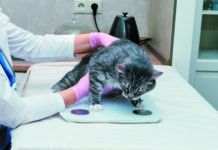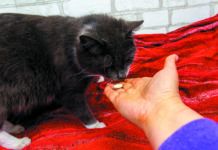If you’ve recently had your cat spayed or neutered and it looks like your pet has put on a few, you’re probably not imagining it. Spaying and neutering don’t cause weight gain, but they do create physiological changes that could predispose a cat to packing on extra pounds. The risk for weight gain appears highest during the first year or two after the procedure. In one study published in the British Journal of Nutrition, neutered cats who were fed the same number of calories as intact cats for most of their first year ended up 24 percent heavier, on average. Because the amount of food given to the two groups of cats was the same, it appears that the metabolism of neutered cats slows down, causing fewer calories to be burned. But there’s more to it than just a decrease in calorie burning.
The hormonal factor
The loss of sex hormones when a cat’s ovaries or testicles are removed (estrogen for females, testosterone for males) can make a cat less likely to engage in physical activity, meaning the animal is less likely to burn as many calories moving around. It’s a double whammy. Fewer calories are required because of a slowdown in metabolism, and the cat’s slowed-down lifestyle means fewer calories are “used up.”
Other hormones may be affected, too, such as ghrelin. Ghrelin stimulates appetite, and research conducted at the School of Veterinary Medicine at the University of California, Davis, showed a significant increase in ghrelin concentrations in neutered cats both days after the procedure and 6 months later. A hormonal shift resulting in an increased appetite is the last thing a cat needs when less food is now needed to maintain body weight. The same piece of research showed that levels of a hormone called adiponectin, which protects against obesity, decreased after cats were neutered.
Excess weight not a foregone conclusion
A spay or neuter for your cat is a nutritional inflection point. To help your pet maintain ideal body weight, you may have to change the amount you feed and maybe even the food itself. How many fewer calories should the cat get? A calorie reduction of up to 30 percent may be necessary for some cats to avoid weight gain post-spaying or neutering.
Speak to your veterinarian to get a sense of how that translates in terms of reduced portion sizes. In some cases, the doctor may advise you to switch to a food that has a lower calorie density and a higher nutrient density. That will provide a wider safety margin for measuring while reducing the risk that fewer calories will mean less nutrients.
You’ll also want to make a conscious effort to engage with your cat more in physical activity. Just as boredom often leads to excess eating for people as a way to break up the tedium, it may make cats want to nosh on extra calories, too. Playing with your cat more and having him engage in games and training activities can work wonders for keeping an animal’s mind off meals and snacks — even as he or she burns calories during the physical activity.





I remember getting my cat “fixed”; then he seemed to “pack it on”. The vet said to play a game or use toys for about 15 mins. a day.
We had Smudge fixed at 6 months. She is now almost 3. She is still very hyper and plays. We do keep her engaged with games of “tag” and she loves to walk with us outside. We do that every day with her. She loves to supervise all we do. We talk with her and that keeps her moving around to see what we do.